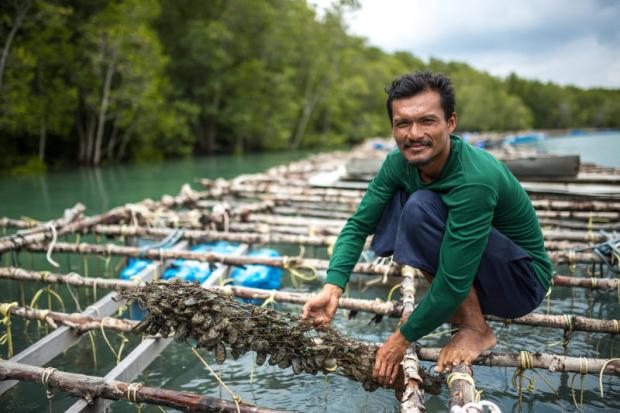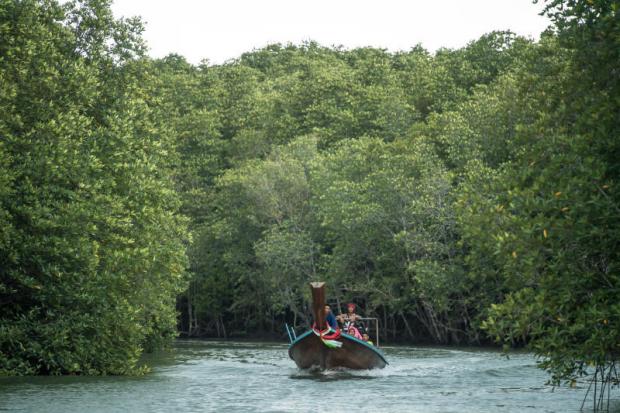
Nestled in Phangnga Bay about 20 kilometres east of Phuket is Baan Bang La, a small Muslim village of 150 households. It is surrounded by lush mangrove forests and untouched coral reefs. Local residents make a living from aquaculture, coastal fishing and small-scale rubber farms.
In the past 10 years, commercial land development has made a rapid advancement into the village. Intruders have made bogus ownership claims to grab public land and the villagers had no choice but fight back to conserve the mangrove forests as well as marine and coastal resources.
With a small grant from the Global Environment Facility's Small Grants Programme (GEF SGP) implemented by the United Nations Development Programme (UNDP), a group of local residents and their peers from two adjacent villages mustered the strength to protect the natural resources their lives depend on.
But they are not fighting alone. The conservation efforts are being assisted by local and provincial authorities, the Department of Marine and Coastal Resources, universities and local schools.
So far, they have kept the 1,200-rai of community mangrove forests that infringe on the estuary intact. The land is a spawning ground for precious aquatic animals. The conservation work is lending a richness to the area, dubbed the "seafood supermarket" by locals.
Fish, crabs, prawns and other marine inhabitants are abundant in this area. They feed local households and further-afield communities in other parts of Phuket and nearby provinces such as Krabi and Phangnga.
Established in 1992, the same year the Rio Earth Summit was held, the GEF SGP embodies the very essence of sustainable development by "thinking globally, acting locally".
By providing financial and technical support to projects that conserve and restore the environment while enhancing people's well-being and livelihoods, the GEF SGP demonstrates that the community's collective action can maintain the fine balance between human needs and environmental imperatives.
Over the last decade of development and local empowerment, the Baan Bang La Conservation Group has laid down systematic and participatory rules and regulations for the sustainable use of mangrove-based and marine resources among its members.
Their long-standing efforts to protect mangrove sanctuaries and communities have also been well recognised internationally. The group was recently awarded the international Equator Prize. Chosen from 806 nominations in 120 countries, the community is one of 15 winners of the Equator Prize, organised by the Equator Initiative of the United Nations Development Programme. This recognises outstanding community efforts to reduce poverty through conservation and sustainable use of marine resources.The living proof of their success is the return of Phuket sea otters after a 20-year absence.
These small-clawed otters have not only returned but also proliferated as their habitats are restored and protected. Their sources of food and habitat, such as horse mussels and sea grass, are becoming more abundant in the demarcated zone.
"The award recognises the power of people to achieve great results for their communities, for future generations and for the world -- the people of Baan Bang La have done just that and will continue to do so.
"We are very proud to have been part of their journey to make a difference to the lives of people and the habitats of marine life," said Lovita Ramguttee, UNDP Thailand deputy resident representative.
A community savings group was also set up to develop alternative livelihoods, support financial and welfare schemes for community members, and provide sustainable financial resources to sustain the mangrove forests in the long run, said Aroon Bamroongna, leader of the Community Mangrove Forest Conservation of Baan Bang La.
"We are very glad to receive this recognition. It gives us more strength to continue conserving our mangrove sanctuary, which is our source of life.
"The money received from the award will go into our community conservation fund to support Baan Bang La and other communities in the Phangnga Bay Networks to protect the mangroves, coastal resources and otters," said Mr Aroon.
As sustainable community initiatives take root, they are laying the foundation for a global movement of local successes that are collectively making a contribution to achieving the Sustainable Development Goals (SDGs), especially Goal 14, which focuses of sub-aquatic life, and Goal 16, which aims to promote a peaceful and inclusive society for sustainable development.
The success of the Baan Bang La conservation group also serves as an inspiration and case study for other nearby fishing communities, including Baan Ao Kung, or Shrimp Bay Village, which is facing a high tide of mainstream tourism and commercial land development.
The area is a stone's throw from a prime spot where a multi-million-baht marina is scheduled to be built, as Thailand sets its sights on establishing the country as a new marina hub.
Ongoing efforts by locals and conservationists to preserve the unspoiled, shallow coral reef that is now under threat were shared on social media. This prompted the authorities to review the Environment Impact Assessment (EIA) for the marina project.
Conservationists claim essential information was sorely lacking as only one villager participated in the public hearing for the project. The EIA was undertaken in an area with a radius of just 1 kilometre in Ao Kung Bay, which critics said was too small to provide adequate results.
Because of this, the Office of Natural Resources and Environmental Policy and Planning (Onep) recently rescinded its approval of the project. It said more details ought to be reflected in the EIA, and effectively put project on hold.
The shallow sea in Ao Kung is a major source of food for marine life and is home to significant coral reef as the mangrove-covered shoreline stretches over 3,000 rai.
Meanwhile, the coastal area of Ao Kung facing Phuket and Phangnga Bay is still relatively quiet and rich in marine resources and shoreline mangrove forests despite the coral bleaching.
"It would be a huge mistake if coral reefs and mangroves had to be sacrificed to make way for the construction of a marina," said Aod Somtip, a local fisherman who was born and raised in the community.
"We wouldn't be able to keep our way of life. The frequency which boats used for tourism, or by tourists, would be sailing in and out of the marina would disturb marine life," said Ubon Chaiyamart, who for 40 years has earned his crust from near-shore traditional fishing at Ao Kung and Ao Phangnga.
"Fish, crabs and molluscs in the shallow water would disappear [if the marina project goes ahead]," he added.
He said the areas are endowed with marine resources and seafood, including prized blue crabs, molluscs and fish. Traditional fishing could die if major building projects see the light of day, he added.
Punya Sampaorat, the mayor of Paklok municipality which oversees the area, admitted the marina project development would affect coastal resources such as mangroves, seagrass and coral reefs.
Champions of the project say it would boost tourism and trade, spelling good news for the local economy and creating jobs at a time when few young people are willing to enter the traditional fishery business.
A solution must be found in the balance between well-managed coastal resources and economic prosperity as marine biodiversity preservation is urgently needed, Mr Punya said.

main picture and insets A bird's-eye view of Baan Bang La, a 150-household Muslim village surrounded by lush mangrove forests and unspoilt nature. The mangrove forests are home to many wild animals, which helps to strike an ecological balance. An area comprising over 1,200-rai of community mangrove forest has been dubbed 'the seafood supermarket'.